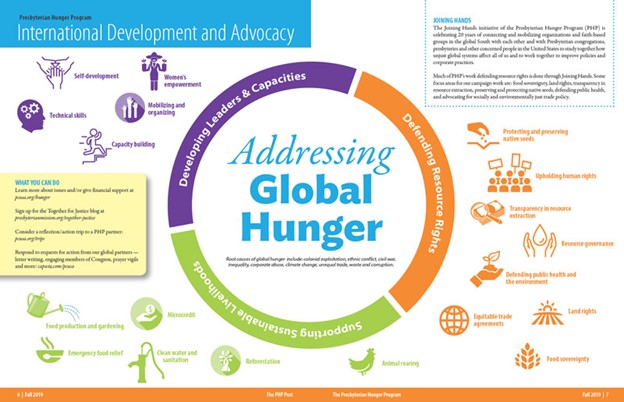At this time, we are lifting up the need to respond further in nations suffering from extreme hunger and famine, including Yemen, Somalia, Nigeria, and South Sudan. Learn more.
Presbyterian Hunger Program responds to global hunger and poverty through two main approaches:
Development projects: supporting people’s efforts to respond to their immediate needs using community-based approaches.
Advocacy: campaign work done primarily through the Joining Hands initiative, where global partners come together with Presbyterians and others to identify and address policies and corporate practices that create or perpetuate hunger and poverty.
We support partners to address hunger, poverty, and injustice around the world by:
- Supporting Sustainable Livelihoods
PHP supports poor and marginalized communities through community-based sustainable development projects that promote dignified work and ensure sustainable livelihoods. These projects empower people to feed themselves, their families and their communities in ways which respect their culture, the land, and traditional knowledge.
- Developing Leaders and Building Capacities
PHP believes not only in providing poor people and communities with training and skills that help them to achieve their development goals, but we also prioritize building the capacity of individuals and organizations to identify root causes of poverty in their communities and organize for change.
- Defending Resource Rights
PHP accompanies civil society groups and communities as they struggle to protect and defend fundamental human rights to land and natural resources.
The Presbyterian Hunger Program accompanies communities and civil society organizations as they come together to challenge systems that generate hunger, poverty, and injustice. We support advocacy campaigns that aim to improve policies or corporate practices that impact fundamental rights to water, food, land, and other natural resources.
In today’s globalized world, with the high demand for food, water, energy and other resources, poor communities that depend on these resources for their survival often face challenges to ownership, management of, and access to their natural resources. These communities are confronted with problems of seed monopolies, land grabbing, mining pollution, and trade policies that favor foreign investors over people.
Powerful actors such as governments, private investors, multinational corporations, and multilateral banks motivated by profit set policies that favor the large-scale extraction of resources with minimal or no benefits for local communities.
Responding to poverty through projects alone is not enough if the systems that create or perpetuate hunger and poverty are not properly identified, analyzed, and challenged. PHP supports the rights of local communities to protect their natural resources, environment, health, and livelihoods.
Much of PHP’s work defending resource rights is done through Joining Hands. Some focus areas for our campaign work are food sovereignty, land rights, transparency in resource extraction, preserving and protecting native seeds, defending public health and international trade agreements.
Banner photo thanks to Nature for Life Conservation Initiatives, PHP grant partner in Uganda

